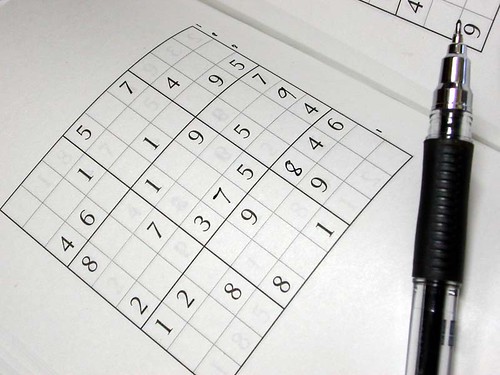Should I learn Sudoku?
Despite the fact that sudokus are not math problems, solving the puzzles requires the most basic tool of mathematics and science: logic. Because sudokus uses logic, common sense, and concentration, the brain is forced out of mindless activities. Quite simply, your brain gets a workout. Reports show that brains work better as more skills are used. Brains getting more work out are more active and its cells are healthier. Researchers even associate sudoku brain exercises to activity. They stress that as activity keeps muscle loss from increasing, sudoku exercise keeps cognitive abilities from dying and also encourages better thinking processes. Thus, if you're looking for ways to train your brain, then consider sudoku. Education is critical, but studies actually show that students that do mental workouts like sudoku have higher IQs than students that not. This only signifies that doses of sudoku are definitely more than solutions to pass time. They assistance with gaining better capability to comprehend more complex ideas.
A neuroscientist facilitated a research among the list of elderly with all the premise that decreased capacity seriously isn't inevitable using the right stimulation. Your research included two groups of elderly people: the primary group solved sudokus as part of their routine, as the second did not. Later, their IQ levels were tested and in comparison to their test results prior to experiment. The sudoku-solving group was discovered to possess increased their mental abilities by way of significant percentage as the other group showed no change. Dr. Robertson cited an identical research wherein 3,000 people, aged 65-94, were found to have increased their mental capabilities and age up to 14 years, simply by ten sessions of brain boosting exercise like sudoku.
Other experts agree with these bits of information, on the grounds that solving challenging mind games like sudoku inhibit or avoid the growth of Alzheimer's disease and forgetfulness. Health trends also show that adults with demanding, and intellectually challenging jobs reap the benefits of better mental function every time they age. Sudoku functions the same as these jobs because the device requires brain exertions.
As it is, experts advise adults to encourage children to solve puzzles like sudoku to begin with mental improvement earlier in your life. Sudoku workouts are actually adopted by some schools to stimulate thinking and foster better academic performance of these students. So as an alternative to letting kids view tv, or read comics, hand them sudoku puzzles. Then, you and your kids can defend your ex of sudoku to the people poor souls that do not understand the sweetness, joy, and advantages of solving it.
UPDATE: Chronic fatigue syndrome: Brain training is most cost-effective treatment
A study of 640 patients showed these treatments had the potential to save the economy millions of pounds if they were widely adopted.
The findings were published in the journal PLoS ONE.
However, another treatment favoured by patients' groups was shown to offer little value.
Nobody knows what causes the condition, yet a quarter of a million people in the UK are thought to have it.
The symptoms include severe tiredness, poor concentration and memory as well as muscle and joint pain and disturbed sleep.
read more: http://www.bbc.co.uk/news/health-19076398
UPDATE: There is much more to mental mastery than mind-numbing rote learning, writes Megan Johnston.
Read more: http://www.smh.com.au/national/education/study-gains-train-the-brain-20120826-24uqu.html#ixzz253L0J63ZFor centuries, students have experimented with all sorts of dubious ways to boost their memory. In ancient Greece, classmates wore rosemary in their hair to help them remember. A few decades ago, subliminal techniques surged in popularity; now pupils seek out a caffeine hit when exam pressure ramps up.
The intention remains unchanged but it pays to know which techniques are worth a try and which are best avoided.
Fortunately, today's students have one big advantage over scholars of yore: the science and psychology of memory.
Much of the modern knowledge in this field comes from recent advances in research. And while scientists are still investigating whether brain training can improve memory generally - that is, transfer from one task to another - they already know much about how the basic processes work.
In : health
Tags: brain power brain exercise brain training health brain sudoku

